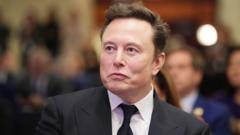Billionaire Elon Musk has stirred the political pot by giving away cheques of $1 million to voters in Wisconsin just days before a pivotal Supreme Court election. This bold move comes after the state’s Supreme Court decided not to intervene against Wisconsin Attorney General Josh Kaul's efforts to stop the giveaway. Kaul claimed the cash gifts violate a state law prohibiting such gifts in exchange for political votes.
The stakes are high in this election, which has become the most expensive judicial race in U.S. history, potentially flipping control of the Wisconsin Supreme Court to Republicans. At a rally, Musk emphasized that the intent of the giveaway was to oppose "activist" judges, handing out cheques to those who signed petitions in support of this cause.
Despite Kaul's lawsuit arguing that Musk's actions were illegal vote-buying, Musk's legal team countered by asserting that any restrictions on his actions impede his First Amendment rights. They claimed these cash prizes aim to build grassroots support rather than directly advocate for or against a specific candidate.
With local and national attention fixated on the election, Musk has publicly endorsed conservative candidate Brad Schimel, while Schimel has suggested that he doesn’t fully align with Musk’s recent actions. The controversy coincides with significant issues expected to reach the court, such as abortion rights, voting laws, and congressional redistricting that could impact the upcoming 2026 midterm elections.
Interestingly, this is not Musk's first foray into electoral giveaways—he previously offered $1 million daily to supportive voters in multiple states, which a Pennsylvania judge later deemed legal. As this unprecedented judicial election unfolds, Musk's $1 million giveaway raises questions about the intersection of money, politics, and free speech in the democratic process.




















